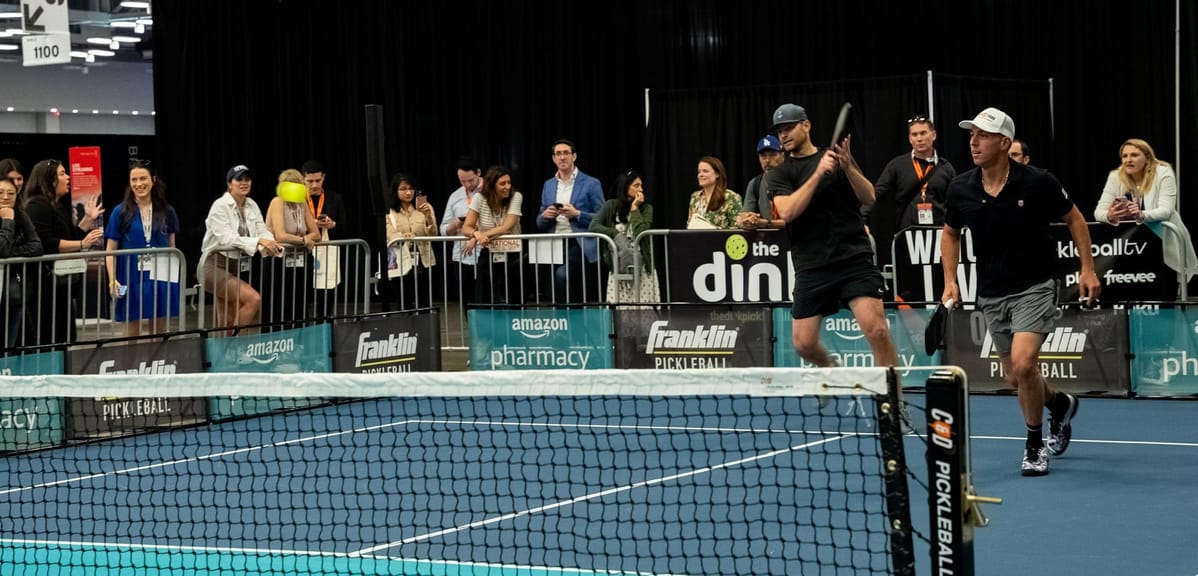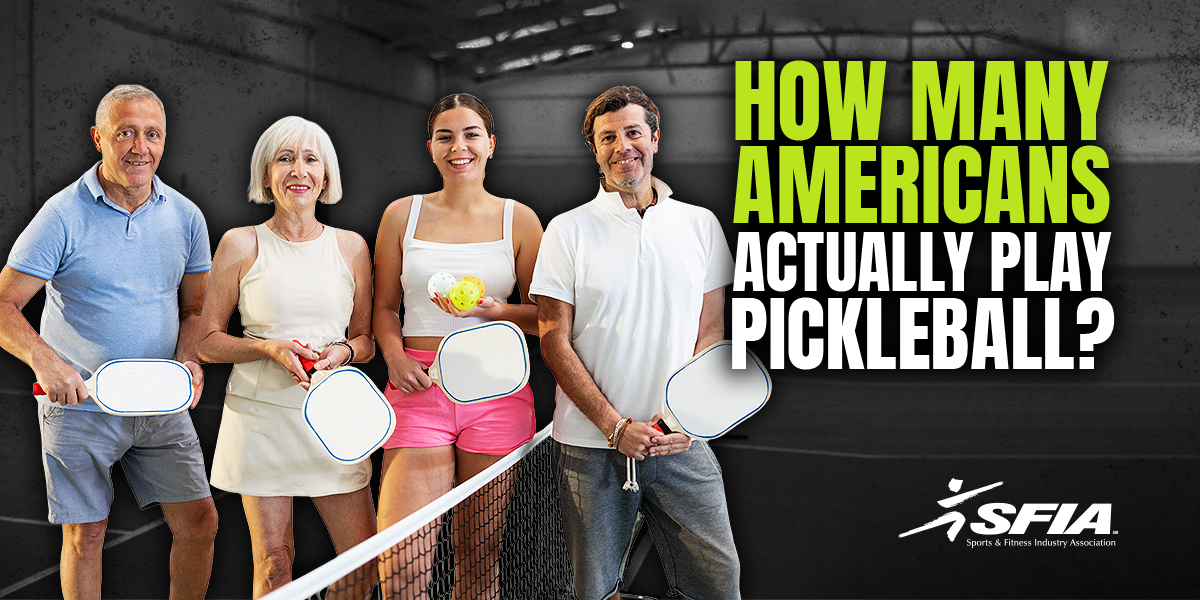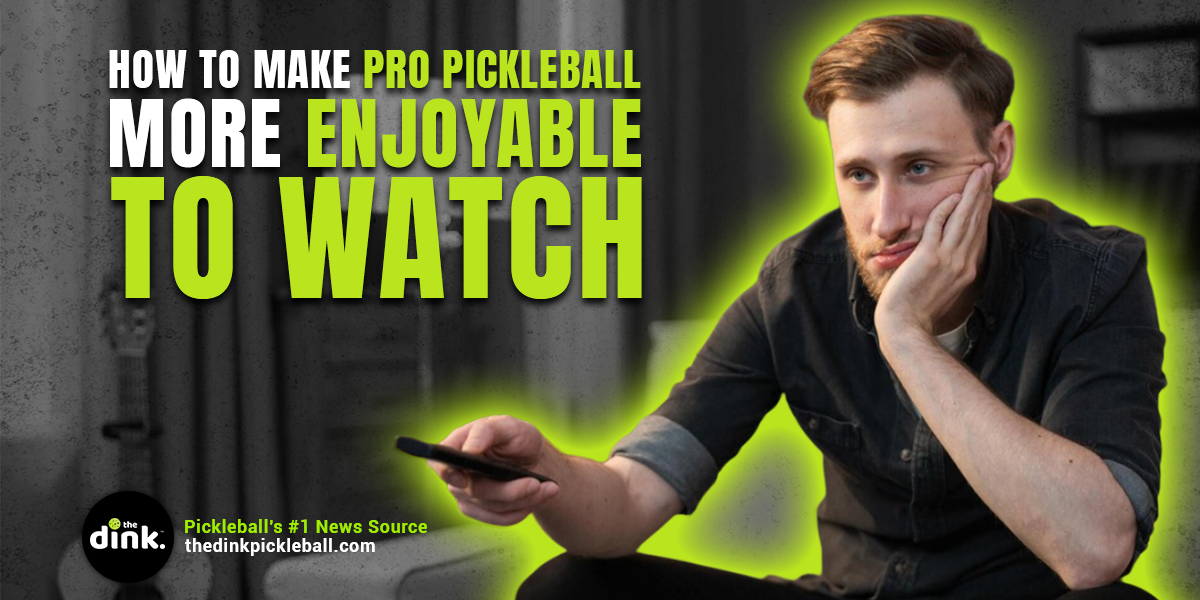
How Can Pickleball Grow as a Spectator Sport? We React to Some Thoughts From Sports Business Journal
An article published on the Sports Business Journal's website earlier this week caught our attention.
The headline: "Can pickleball make it as a mainstay spectator sport?"
The author is Mike Golub, whose bio says:
Mike Golub is a nationally recognized and respected leader in the industry who has led organizations in all five major sports leagues and was twice named MLS Executive of the Year.
Golub is also a two-time Major League Soccer Executive of the Year.
The piece was well-written and raised some key points. We thought it might be interesting to break down his recommendations and offer our own take on each of those points.
Introduction
Right off the top, he mentions the explosive growth of pickleball (224 percent participation growth over the last three years).

Then Golub poses a question: "Can it be a viable professional spectator sport?"
He brings up the UFC and Major League Soccer as case studies that successfully became great for viewers after a "nonlinear, often bumpy multi-decade evolution."
Golub then opines that while the PPA Tour has already done an admirable job, everyone would agree there's plenty of room to grow.
He breaks down five "musts" if pickleball is going to become a successful sport from a viewership perspective. This includes:
- Double down on broadcast
- Statistics
- Betting
- Major League Pickleball
- Peace in the pickleball ecosystem
Let's discuss each one:
1. Double down on broadcast production
Key Point: The article argues that pickleball needs to invest heavily in broadcast technology to capture its fast-paced nature and appeal to a broader audience. It suggests ideas like spider cams, in-match audio, and advanced statistical overlays.
Our Take: Strongly agree. The essence of pickleball is its speed and excitement, which can be challenging to convey through traditional broadcast methods.

Enhanced viewing angles, real-time stats, and on-court audio would give fans a richer experience and could be a game-changer in how the sport is consumed.
However, it’s also important to ensure that these innovations don’t overwhelm the simple, approachable nature that many fans love about the sport.
We certainly don't want a "glowing puck" situation like the NHL had in the late 1990s. We don't need gimmicks. We need game-viewing enhancements.
2. Statistics
Key Point: Golub points out the lack of real-time statistics in pickleball broadcasts, suggesting that detailed stats could enhance the viewer experience and deepen fan engagement.
Our Take: Strongly Agree. Statistics are a critical part of fan engagement in any sport. They provide context, allow for comparisons, and offer insights that can turn casual viewers into dedicated fans.
While the simplicity of pickleball is a big part of its appeal, introducing well-presented, easy-to-understand statistics would help in educating new fans and keeping seasoned ones hooked.
It also informs the audience of important milestones beyond the usual triple crowns, Ben Johns' gold medal streak, or team win-loss records.
3. Betting
Key Point: The original piece highlights sports betting as a potential driver for fan engagement and economic growth within pickleball.
Our Take: Agree, with caution. There’s no denying that sports betting has boosted engagement in other sports. Pickleball’s fast pace and frequent matches are well-suited for betting markets. However, this also brings potential downsides, such as the risk of match-fixing or the over-commercialization of a sport that many still see as grassroots.
The pickleball community must carefully consider how to integrate betting in a way that enhances the sport without compromising its integrity.
4. Major League Pickleball
Key Point: He suggests that for Major League Pickleball (MLP) to thrive, it needs to foster stronger connections between teams and their cities, potentially through local events and community programs.
Our Take: Agree. Building a strong fan base often starts with local pride. MLP teams need to become more than just names on a roster – they should represent their cities in a way that fans can rally behind.
Local training camps, community engagement, and city-hosted matches in city-owned venues could boost fan loyalty and create lasting bonds between teams and their communities.
Being able to "play where the pros play" seems like it would be an interesting draw for a pickleball club in a community, especially if there's a chance of running into these pros at that venue.
The good news is there are several team owners who have already expressed the desire for their MLP team to integrate into its city more. The St. Louis Shock being one of them.

5. Achieving peace in the pickleball ecosystem
Key Point: The final point stresses the need for unity among pickleball’s governing bodies, particularly between the UPA, MLP, and USA Pickleball, to avoid conflicts that could hinder the sport’s growth.
Our Take: Strongly Agree. Internal conflicts and power struggles can cripple even the most promising sports.
For pickleball to reach its full potential, each organization must have clear, cooperative roles.
The UPA should focus on professional development, while the APP and USA Pickleball should concentrate on grassroots growth and international representation. By working together, these organizations can ensure that pickleball continues its upward trajectory.
Eventually, this should solve itself, but hopefully it doesn't take the sport down before it does.
Pickleball has tremendous momentum right now. But how it navigates these challenges will determine whether it can truly secure its place on the global sports stage.

Love Pickleball? Join 100k+ readers for free weekly tips, news & gear deals.
Subscribe to The DinkGet 15% off pickleball gear at Midwest Racquet Sports










